Sustainability Strategy in Tourism: A Study on the Hospitality Sector
VerifiedAdded on 2021/02/20
|12
|3521
|33
Project
AI Summary
This research proposal investigates sustainability strategies within the tourism and hospitality sector, with a specific focus on the TUI group. The research aims to identify the challenges companies face in implementing sustainability initiatives and to determine the factors that can help overcome these issues. The proposal outlines the research background, aims, objectives, and research questions, followed by a literature review exploring themes such as understanding sustainability, identifying issues, and examining factors for overcoming challenges. The methodology section details the research type (qualitative), approach (inductive), philosophies (interpretivism), data collection methods (primary and secondary), sampling techniques (non-probabilistic), and data analysis methods (thematic). Ethical considerations, reliability, and validity are also addressed. A Gantt chart provides a timeline for project completion, including project initiation, formulation of topic, aims and objectives, research questions, project planning, research methodology, data collection, data analysis, project execution, interpretation of data, project implementation, conclusion, recommendation, and reflection. The project seeks to provide insights and recommendations to enhance corporate strategy through effective sustainability practices.
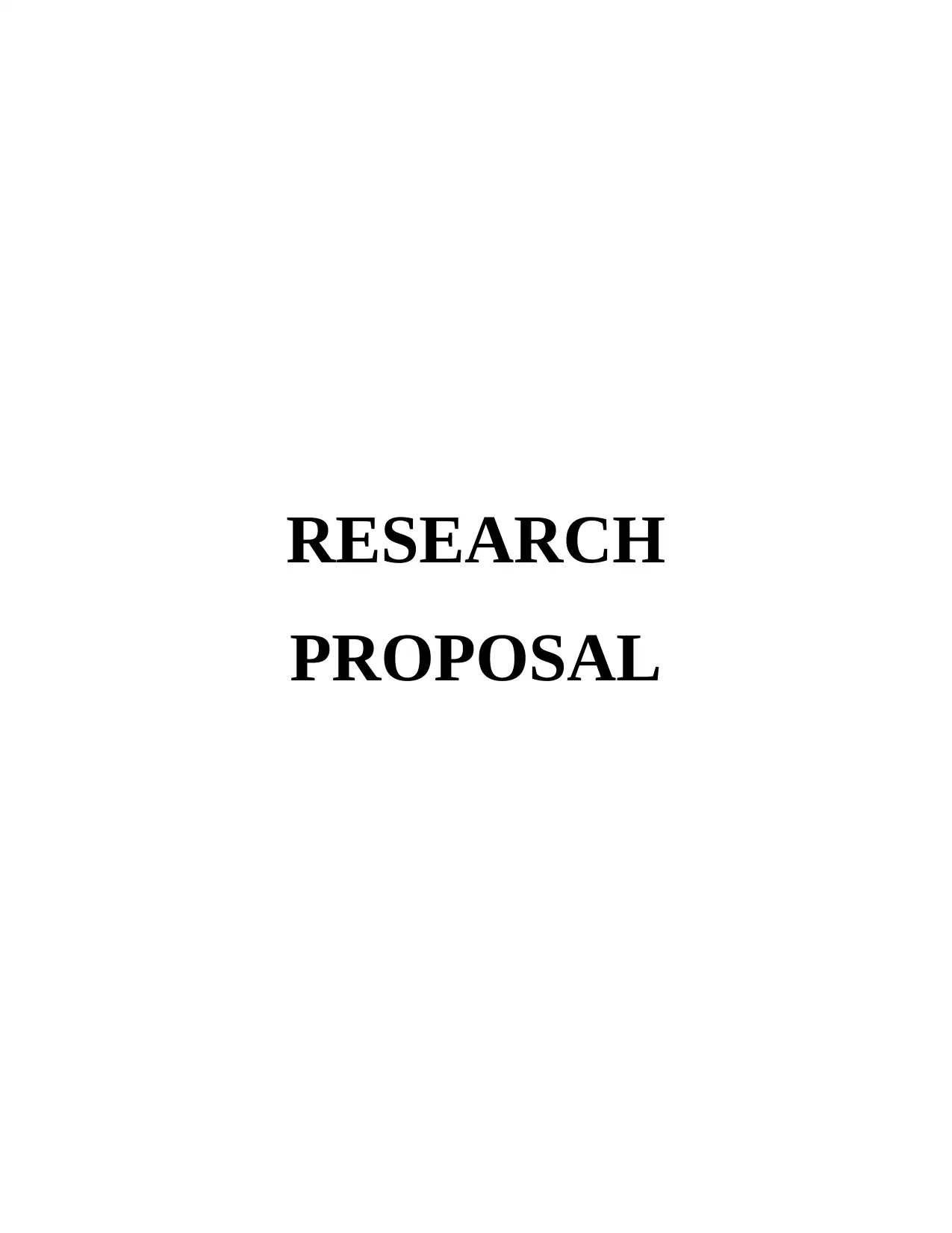
RESEARCH
PROPOSAL
PROPOSAL
Paraphrase This Document
Need a fresh take? Get an instant paraphrase of this document with our AI Paraphraser
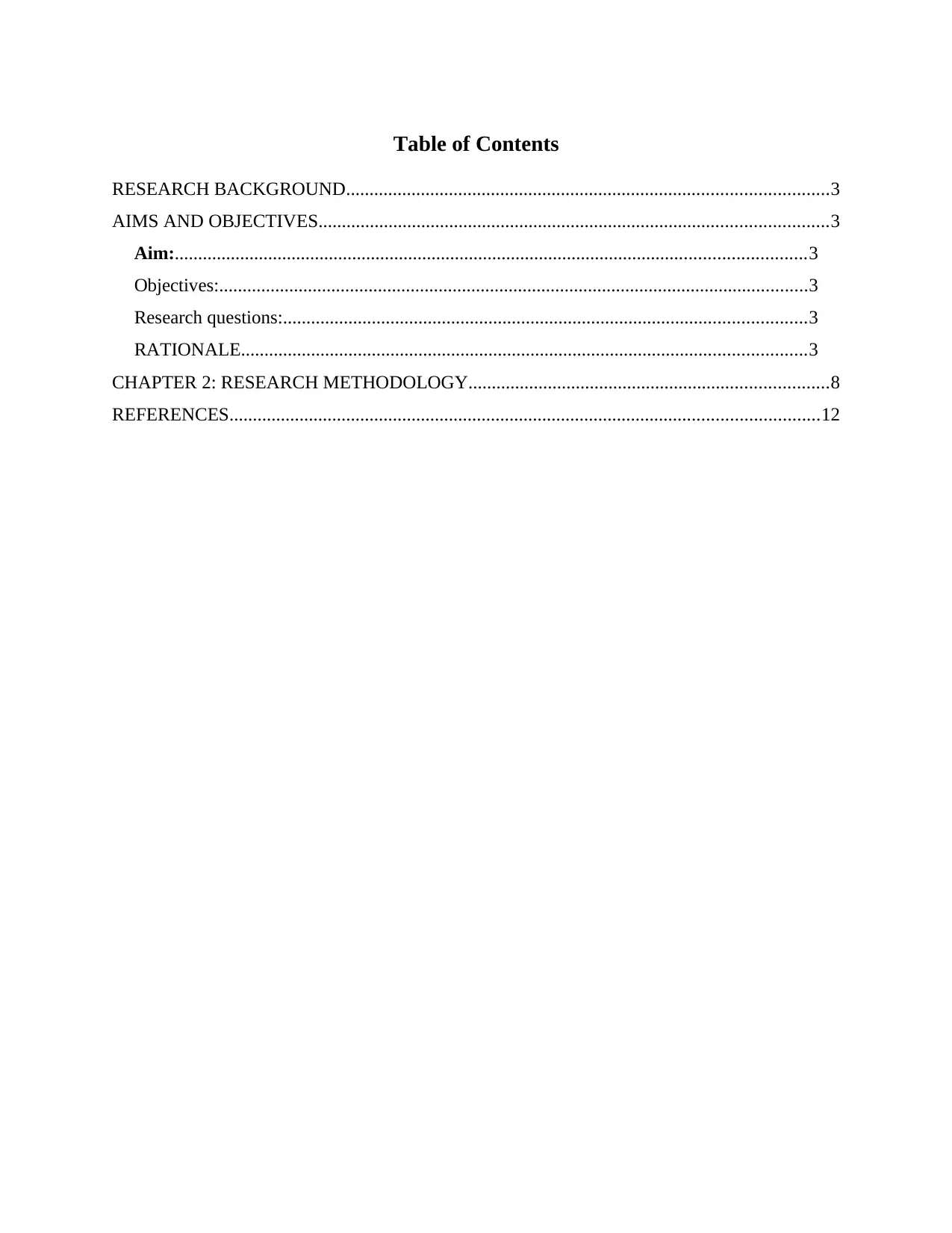
Table of Contents
RESEARCH BACKGROUND.......................................................................................................3
AIMS AND OBJECTIVES.............................................................................................................3
Aim:.......................................................................................................................................3
Objectives:..............................................................................................................................3
Research questions:................................................................................................................3
RATIONALE.........................................................................................................................3
CHAPTER 2: RESEARCH METHODOLOGY.............................................................................8
REFERENCES..............................................................................................................................12
RESEARCH BACKGROUND.......................................................................................................3
AIMS AND OBJECTIVES.............................................................................................................3
Aim:.......................................................................................................................................3
Objectives:..............................................................................................................................3
Research questions:................................................................................................................3
RATIONALE.........................................................................................................................3
CHAPTER 2: RESEARCH METHODOLOGY.............................................................................8
REFERENCES..............................................................................................................................12
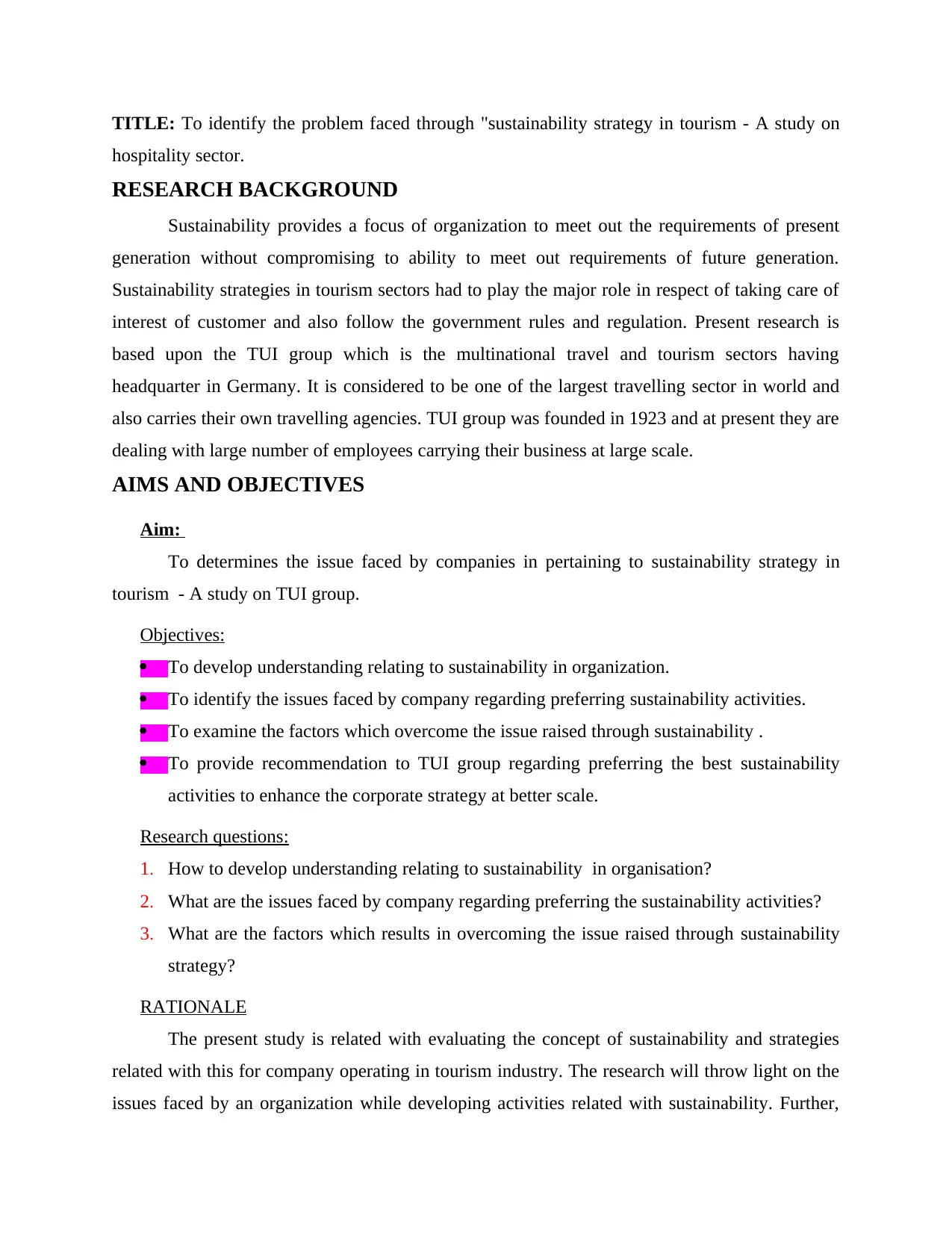
TITLE: To identify the problem faced through "sustainability strategy in tourism - A study on
hospitality sector.
RESEARCH BACKGROUND
Sustainability provides a focus of organization to meet out the requirements of present
generation without compromising to ability to meet out requirements of future generation.
Sustainability strategies in tourism sectors had to play the major role in respect of taking care of
interest of customer and also follow the government rules and regulation. Present research is
based upon the TUI group which is the multinational travel and tourism sectors having
headquarter in Germany. It is considered to be one of the largest travelling sector in world and
also carries their own travelling agencies. TUI group was founded in 1923 and at present they are
dealing with large number of employees carrying their business at large scale.
AIMS AND OBJECTIVES
Aim:
To determines the issue faced by companies in pertaining to sustainability strategy in
tourism - A study on TUI group.
Objectives:
To develop understanding relating to sustainability in organization.
To identify the issues faced by company regarding preferring sustainability activities.
To examine the factors which overcome the issue raised through sustainability .
To provide recommendation to TUI group regarding preferring the best sustainability
activities to enhance the corporate strategy at better scale.
Research questions:
1. How to develop understanding relating to sustainability in organisation?
2. What are the issues faced by company regarding preferring the sustainability activities?
3. What are the factors which results in overcoming the issue raised through sustainability
strategy?
RATIONALE
The present study is related with evaluating the concept of sustainability and strategies
related with this for company operating in tourism industry. The research will throw light on the
issues faced by an organization while developing activities related with sustainability. Further,
hospitality sector.
RESEARCH BACKGROUND
Sustainability provides a focus of organization to meet out the requirements of present
generation without compromising to ability to meet out requirements of future generation.
Sustainability strategies in tourism sectors had to play the major role in respect of taking care of
interest of customer and also follow the government rules and regulation. Present research is
based upon the TUI group which is the multinational travel and tourism sectors having
headquarter in Germany. It is considered to be one of the largest travelling sector in world and
also carries their own travelling agencies. TUI group was founded in 1923 and at present they are
dealing with large number of employees carrying their business at large scale.
AIMS AND OBJECTIVES
Aim:
To determines the issue faced by companies in pertaining to sustainability strategy in
tourism - A study on TUI group.
Objectives:
To develop understanding relating to sustainability in organization.
To identify the issues faced by company regarding preferring sustainability activities.
To examine the factors which overcome the issue raised through sustainability .
To provide recommendation to TUI group regarding preferring the best sustainability
activities to enhance the corporate strategy at better scale.
Research questions:
1. How to develop understanding relating to sustainability in organisation?
2. What are the issues faced by company regarding preferring the sustainability activities?
3. What are the factors which results in overcoming the issue raised through sustainability
strategy?
RATIONALE
The present study is related with evaluating the concept of sustainability and strategies
related with this for company operating in tourism industry. The research will throw light on the
issues faced by an organization while developing activities related with sustainability. Further,
⊘ This is a preview!⊘
Do you want full access?
Subscribe today to unlock all pages.

Trusted by 1+ million students worldwide
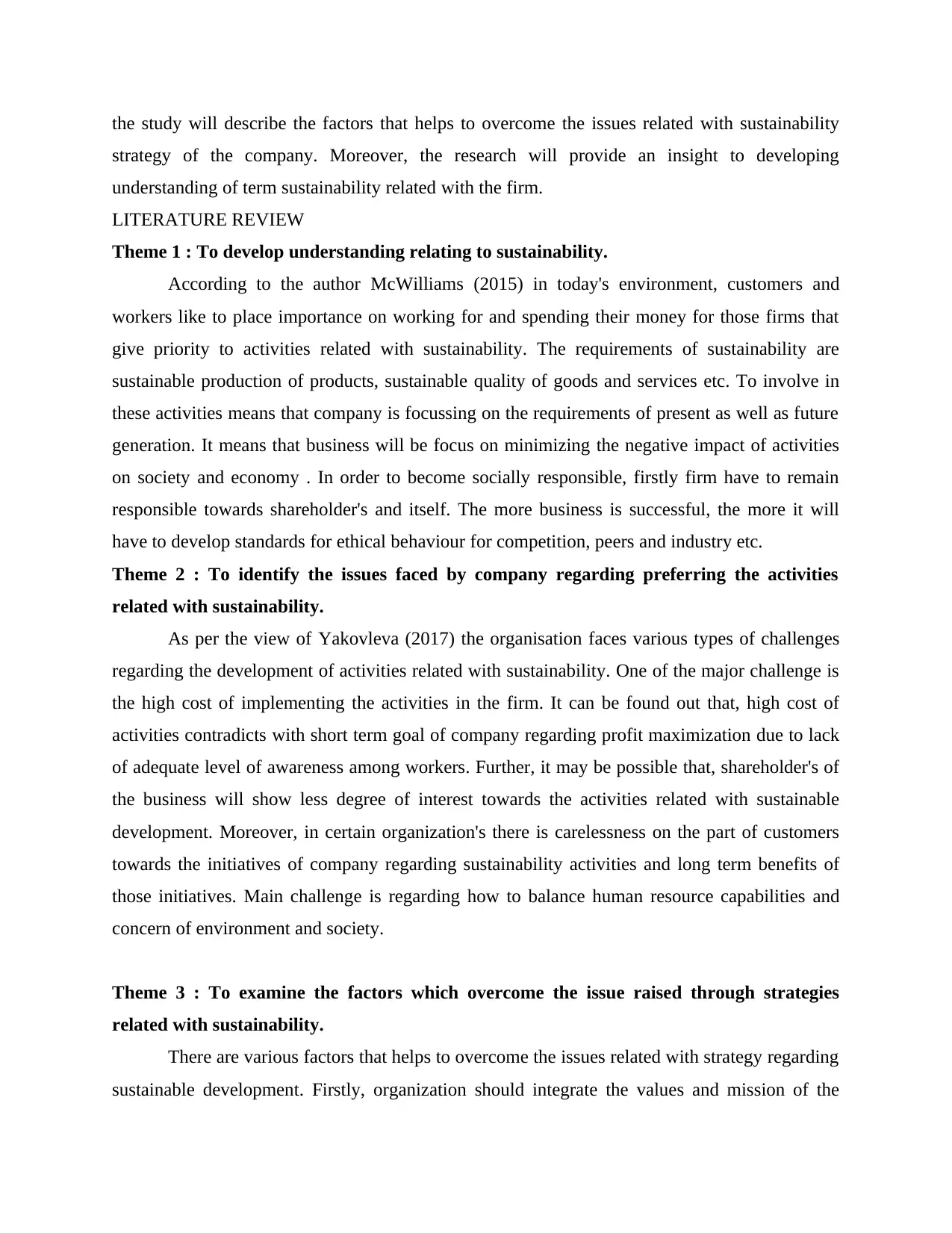
the study will describe the factors that helps to overcome the issues related with sustainability
strategy of the company. Moreover, the research will provide an insight to developing
understanding of term sustainability related with the firm.
LITERATURE REVIEW
Theme 1 : To develop understanding relating to sustainability.
According to the author McWilliams (2015) in today's environment, customers and
workers like to place importance on working for and spending their money for those firms that
give priority to activities related with sustainability. The requirements of sustainability are
sustainable production of products, sustainable quality of goods and services etc. To involve in
these activities means that company is focussing on the requirements of present as well as future
generation. It means that business will be focus on minimizing the negative impact of activities
on society and economy . In order to become socially responsible, firstly firm have to remain
responsible towards shareholder's and itself. The more business is successful, the more it will
have to develop standards for ethical behaviour for competition, peers and industry etc.
Theme 2 : To identify the issues faced by company regarding preferring the activities
related with sustainability.
As per the view of Yakovleva (2017) the organisation faces various types of challenges
regarding the development of activities related with sustainability. One of the major challenge is
the high cost of implementing the activities in the firm. It can be found out that, high cost of
activities contradicts with short term goal of company regarding profit maximization due to lack
of adequate level of awareness among workers. Further, it may be possible that, shareholder's of
the business will show less degree of interest towards the activities related with sustainable
development. Moreover, in certain organization's there is carelessness on the part of customers
towards the initiatives of company regarding sustainability activities and long term benefits of
those initiatives. Main challenge is regarding how to balance human resource capabilities and
concern of environment and society.
Theme 3 : To examine the factors which overcome the issue raised through strategies
related with sustainability.
There are various factors that helps to overcome the issues related with strategy regarding
sustainable development. Firstly, organization should integrate the values and mission of the
strategy of the company. Moreover, the research will provide an insight to developing
understanding of term sustainability related with the firm.
LITERATURE REVIEW
Theme 1 : To develop understanding relating to sustainability.
According to the author McWilliams (2015) in today's environment, customers and
workers like to place importance on working for and spending their money for those firms that
give priority to activities related with sustainability. The requirements of sustainability are
sustainable production of products, sustainable quality of goods and services etc. To involve in
these activities means that company is focussing on the requirements of present as well as future
generation. It means that business will be focus on minimizing the negative impact of activities
on society and economy . In order to become socially responsible, firstly firm have to remain
responsible towards shareholder's and itself. The more business is successful, the more it will
have to develop standards for ethical behaviour for competition, peers and industry etc.
Theme 2 : To identify the issues faced by company regarding preferring the activities
related with sustainability.
As per the view of Yakovleva (2017) the organisation faces various types of challenges
regarding the development of activities related with sustainability. One of the major challenge is
the high cost of implementing the activities in the firm. It can be found out that, high cost of
activities contradicts with short term goal of company regarding profit maximization due to lack
of adequate level of awareness among workers. Further, it may be possible that, shareholder's of
the business will show less degree of interest towards the activities related with sustainable
development. Moreover, in certain organization's there is carelessness on the part of customers
towards the initiatives of company regarding sustainability activities and long term benefits of
those initiatives. Main challenge is regarding how to balance human resource capabilities and
concern of environment and society.
Theme 3 : To examine the factors which overcome the issue raised through strategies
related with sustainability.
There are various factors that helps to overcome the issues related with strategy regarding
sustainable development. Firstly, organization should integrate the values and mission of the
Paraphrase This Document
Need a fresh take? Get an instant paraphrase of this document with our AI Paraphraser
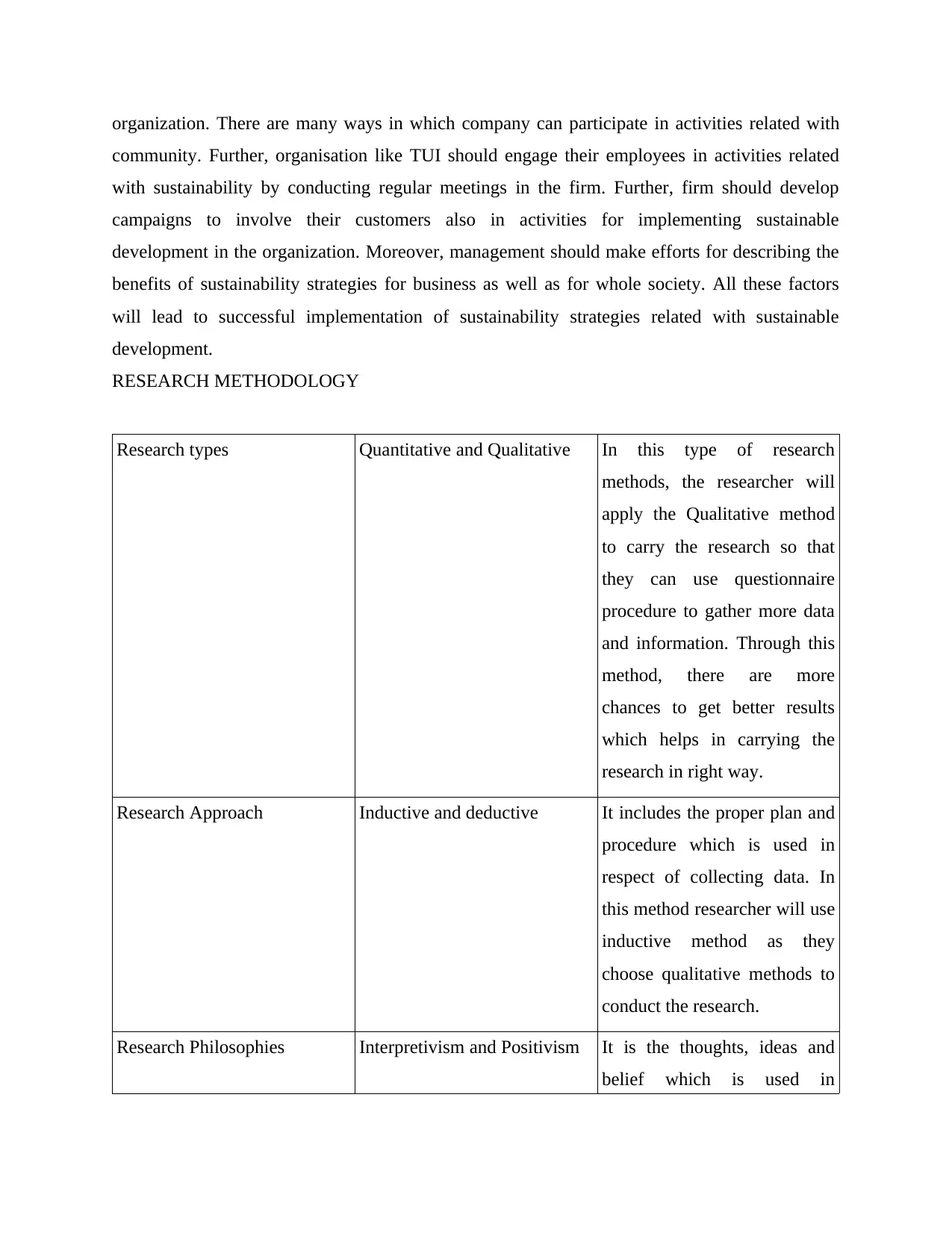
organization. There are many ways in which company can participate in activities related with
community. Further, organisation like TUI should engage their employees in activities related
with sustainability by conducting regular meetings in the firm. Further, firm should develop
campaigns to involve their customers also in activities for implementing sustainable
development in the organization. Moreover, management should make efforts for describing the
benefits of sustainability strategies for business as well as for whole society. All these factors
will lead to successful implementation of sustainability strategies related with sustainable
development.
RESEARCH METHODOLOGY
Research types Quantitative and Qualitative In this type of research
methods, the researcher will
apply the Qualitative method
to carry the research so that
they can use questionnaire
procedure to gather more data
and information. Through this
method, there are more
chances to get better results
which helps in carrying the
research in right way.
Research Approach Inductive and deductive It includes the proper plan and
procedure which is used in
respect of collecting data. In
this method researcher will use
inductive method as they
choose qualitative methods to
conduct the research.
Research Philosophies Interpretivism and Positivism It is the thoughts, ideas and
belief which is used in
community. Further, organisation like TUI should engage their employees in activities related
with sustainability by conducting regular meetings in the firm. Further, firm should develop
campaigns to involve their customers also in activities for implementing sustainable
development in the organization. Moreover, management should make efforts for describing the
benefits of sustainability strategies for business as well as for whole society. All these factors
will lead to successful implementation of sustainability strategies related with sustainable
development.
RESEARCH METHODOLOGY
Research types Quantitative and Qualitative In this type of research
methods, the researcher will
apply the Qualitative method
to carry the research so that
they can use questionnaire
procedure to gather more data
and information. Through this
method, there are more
chances to get better results
which helps in carrying the
research in right way.
Research Approach Inductive and deductive It includes the proper plan and
procedure which is used in
respect of collecting data. In
this method researcher will use
inductive method as they
choose qualitative methods to
conduct the research.
Research Philosophies Interpretivism and Positivism It is the thoughts, ideas and
belief which is used in
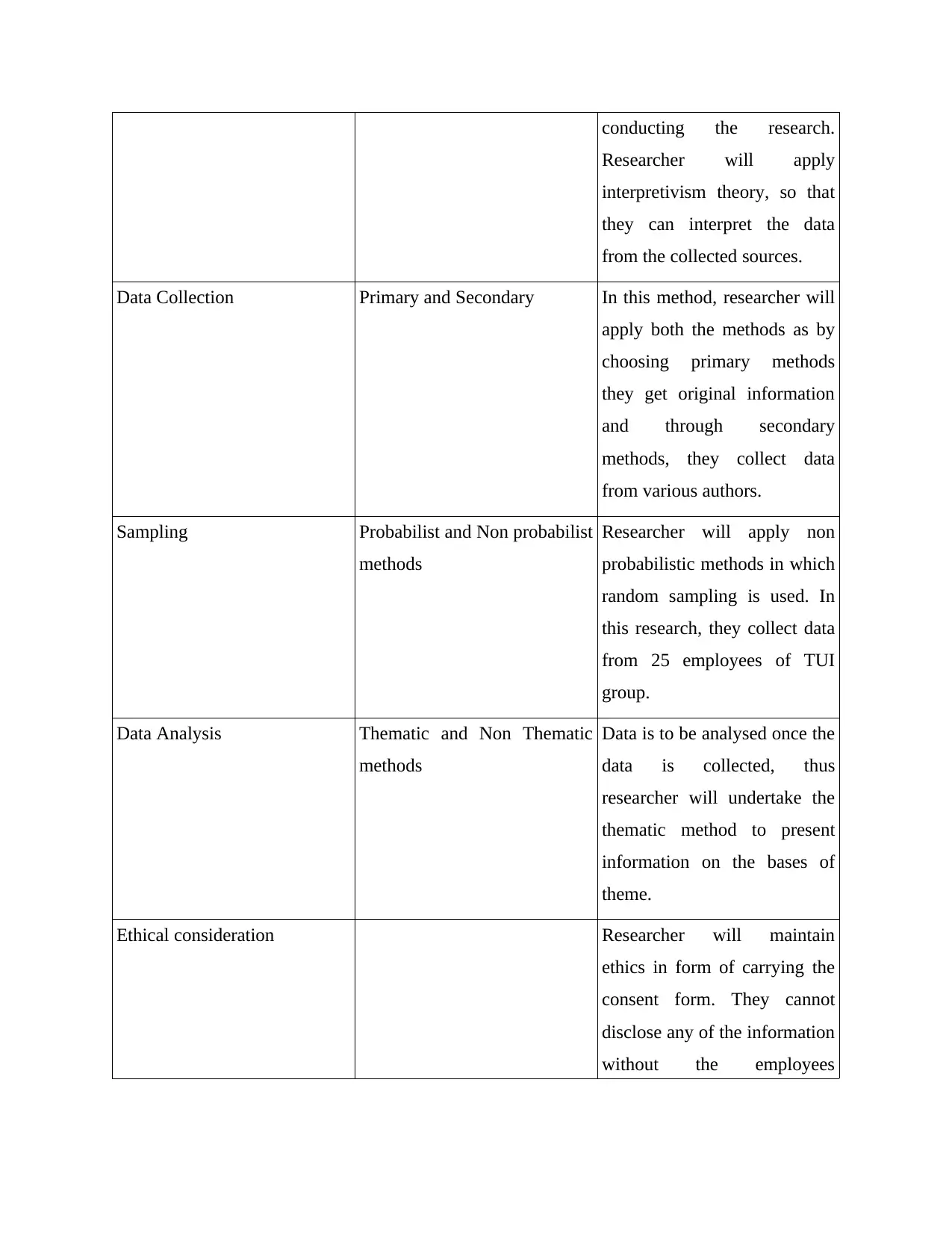
conducting the research.
Researcher will apply
interpretivism theory, so that
they can interpret the data
from the collected sources.
Data Collection Primary and Secondary In this method, researcher will
apply both the methods as by
choosing primary methods
they get original information
and through secondary
methods, they collect data
from various authors.
Sampling Probabilist and Non probabilist
methods
Researcher will apply non
probabilistic methods in which
random sampling is used. In
this research, they collect data
from 25 employees of TUI
group.
Data Analysis Thematic and Non Thematic
methods
Data is to be analysed once the
data is collected, thus
researcher will undertake the
thematic method to present
information on the bases of
theme.
Ethical consideration Researcher will maintain
ethics in form of carrying the
consent form. They cannot
disclose any of the information
without the employees
Researcher will apply
interpretivism theory, so that
they can interpret the data
from the collected sources.
Data Collection Primary and Secondary In this method, researcher will
apply both the methods as by
choosing primary methods
they get original information
and through secondary
methods, they collect data
from various authors.
Sampling Probabilist and Non probabilist
methods
Researcher will apply non
probabilistic methods in which
random sampling is used. In
this research, they collect data
from 25 employees of TUI
group.
Data Analysis Thematic and Non Thematic
methods
Data is to be analysed once the
data is collected, thus
researcher will undertake the
thematic method to present
information on the bases of
theme.
Ethical consideration Researcher will maintain
ethics in form of carrying the
consent form. They cannot
disclose any of the information
without the employees
⊘ This is a preview!⊘
Do you want full access?
Subscribe today to unlock all pages.

Trusted by 1+ million students worldwide
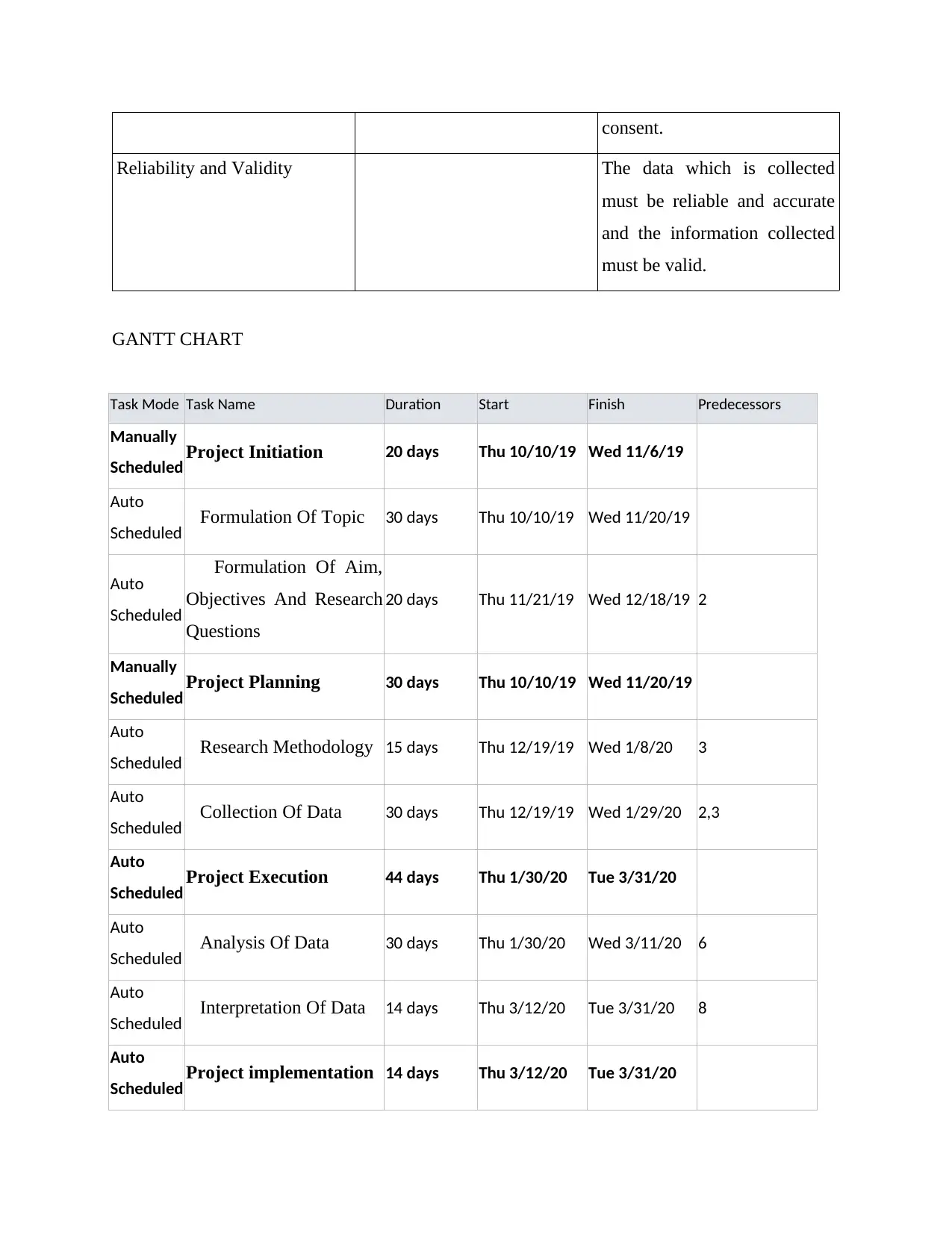
consent.
Reliability and Validity The data which is collected
must be reliable and accurate
and the information collected
must be valid.
GANTT CHART
Task Mode Task Name Duration Start Finish Predecessors
Manually
Scheduled Project Initiation 20 days Thu 10/10/19 Wed 11/6/19
Auto
Scheduled Formulation Of Topic 30 days Thu 10/10/19 Wed 11/20/19
Auto
Scheduled
Formulation Of Aim,
Objectives And Research
Questions
20 days Thu 11/21/19 Wed 12/18/19 2
Manually
Scheduled Project Planning 30 days Thu 10/10/19 Wed 11/20/19
Auto
Scheduled Research Methodology 15 days Thu 12/19/19 Wed 1/8/20 3
Auto
Scheduled Collection Of Data 30 days Thu 12/19/19 Wed 1/29/20 2,3
Auto
Scheduled Project Execution 44 days Thu 1/30/20 Tue 3/31/20
Auto
Scheduled Analysis Of Data 30 days Thu 1/30/20 Wed 3/11/20 6
Auto
Scheduled Interpretation Of Data 14 days Thu 3/12/20 Tue 3/31/20 8
Auto
Scheduled Project implementation 14 days Thu 3/12/20 Tue 3/31/20
Reliability and Validity The data which is collected
must be reliable and accurate
and the information collected
must be valid.
GANTT CHART
Task Mode Task Name Duration Start Finish Predecessors
Manually
Scheduled Project Initiation 20 days Thu 10/10/19 Wed 11/6/19
Auto
Scheduled Formulation Of Topic 30 days Thu 10/10/19 Wed 11/20/19
Auto
Scheduled
Formulation Of Aim,
Objectives And Research
Questions
20 days Thu 11/21/19 Wed 12/18/19 2
Manually
Scheduled Project Planning 30 days Thu 10/10/19 Wed 11/20/19
Auto
Scheduled Research Methodology 15 days Thu 12/19/19 Wed 1/8/20 3
Auto
Scheduled Collection Of Data 30 days Thu 12/19/19 Wed 1/29/20 2,3
Auto
Scheduled Project Execution 44 days Thu 1/30/20 Tue 3/31/20
Auto
Scheduled Analysis Of Data 30 days Thu 1/30/20 Wed 3/11/20 6
Auto
Scheduled Interpretation Of Data 14 days Thu 3/12/20 Tue 3/31/20 8
Auto
Scheduled Project implementation 14 days Thu 3/12/20 Tue 3/31/20
Paraphrase This Document
Need a fresh take? Get an instant paraphrase of this document with our AI Paraphraser
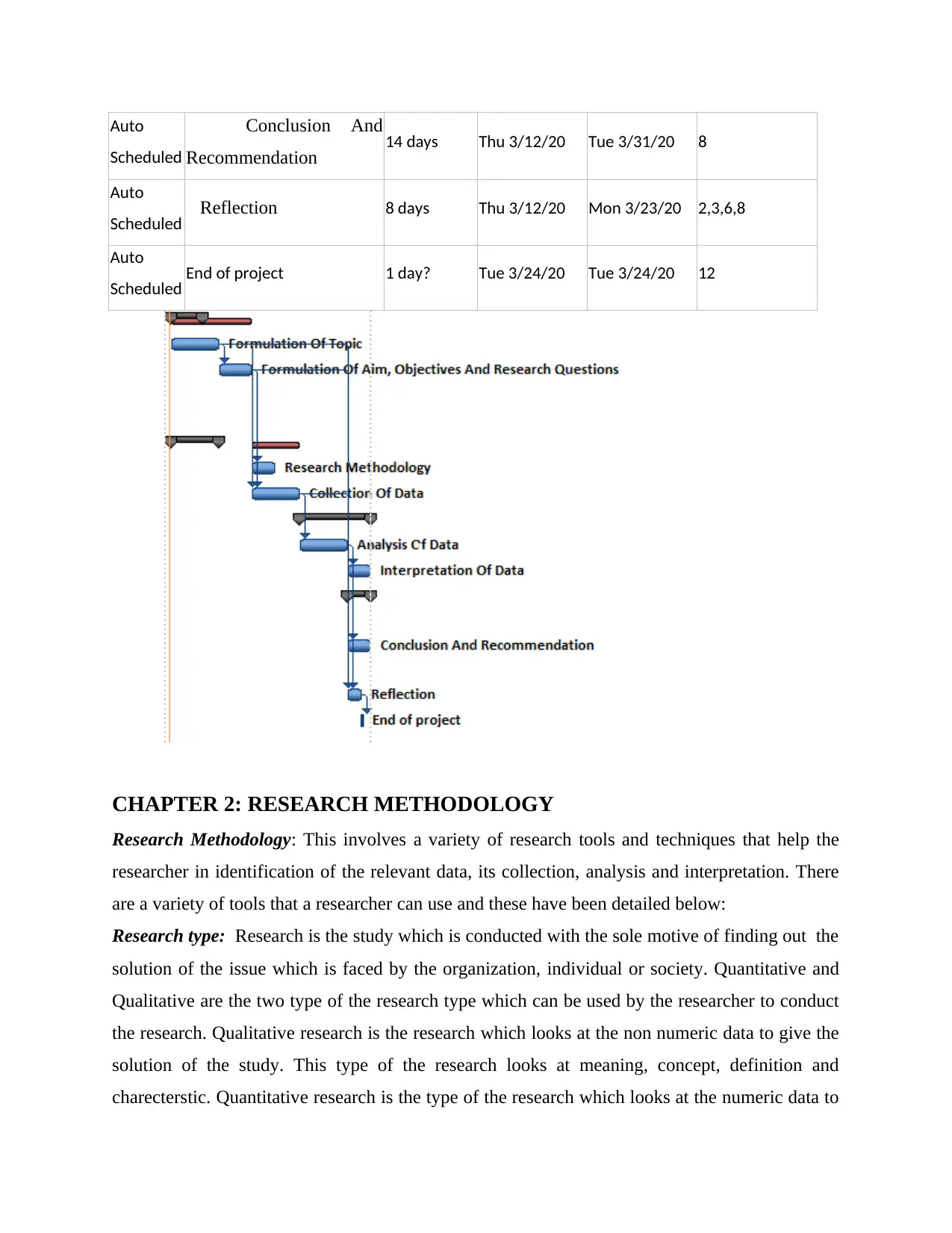
Auto
Scheduled
Conclusion And
Recommendation 14 days Thu 3/12/20 Tue 3/31/20 8
Auto
Scheduled Reflection 8 days Thu 3/12/20 Mon 3/23/20 2,3,6,8
Auto
Scheduled End of project 1 day? Tue 3/24/20 Tue 3/24/20 12
CHAPTER 2: RESEARCH METHODOLOGY
Research Methodology: This involves a variety of research tools and techniques that help the
researcher in identification of the relevant data, its collection, analysis and interpretation. There
are a variety of tools that a researcher can use and these have been detailed below:
Research type: Research is the study which is conducted with the sole motive of finding out the
solution of the issue which is faced by the organization, individual or society. Quantitative and
Qualitative are the two type of the research type which can be used by the researcher to conduct
the research. Qualitative research is the research which looks at the non numeric data to give the
solution of the study. This type of the research looks at meaning, concept, definition and
charecterstic. Quantitative research is the type of the research which looks at the numeric data to
Scheduled
Conclusion And
Recommendation 14 days Thu 3/12/20 Tue 3/31/20 8
Auto
Scheduled Reflection 8 days Thu 3/12/20 Mon 3/23/20 2,3,6,8
Auto
Scheduled End of project 1 day? Tue 3/24/20 Tue 3/24/20 12
CHAPTER 2: RESEARCH METHODOLOGY
Research Methodology: This involves a variety of research tools and techniques that help the
researcher in identification of the relevant data, its collection, analysis and interpretation. There
are a variety of tools that a researcher can use and these have been detailed below:
Research type: Research is the study which is conducted with the sole motive of finding out the
solution of the issue which is faced by the organization, individual or society. Quantitative and
Qualitative are the two type of the research type which can be used by the researcher to conduct
the research. Qualitative research is the research which looks at the non numeric data to give the
solution of the study. This type of the research looks at meaning, concept, definition and
charecterstic. Quantitative research is the type of the research which looks at the numeric data to
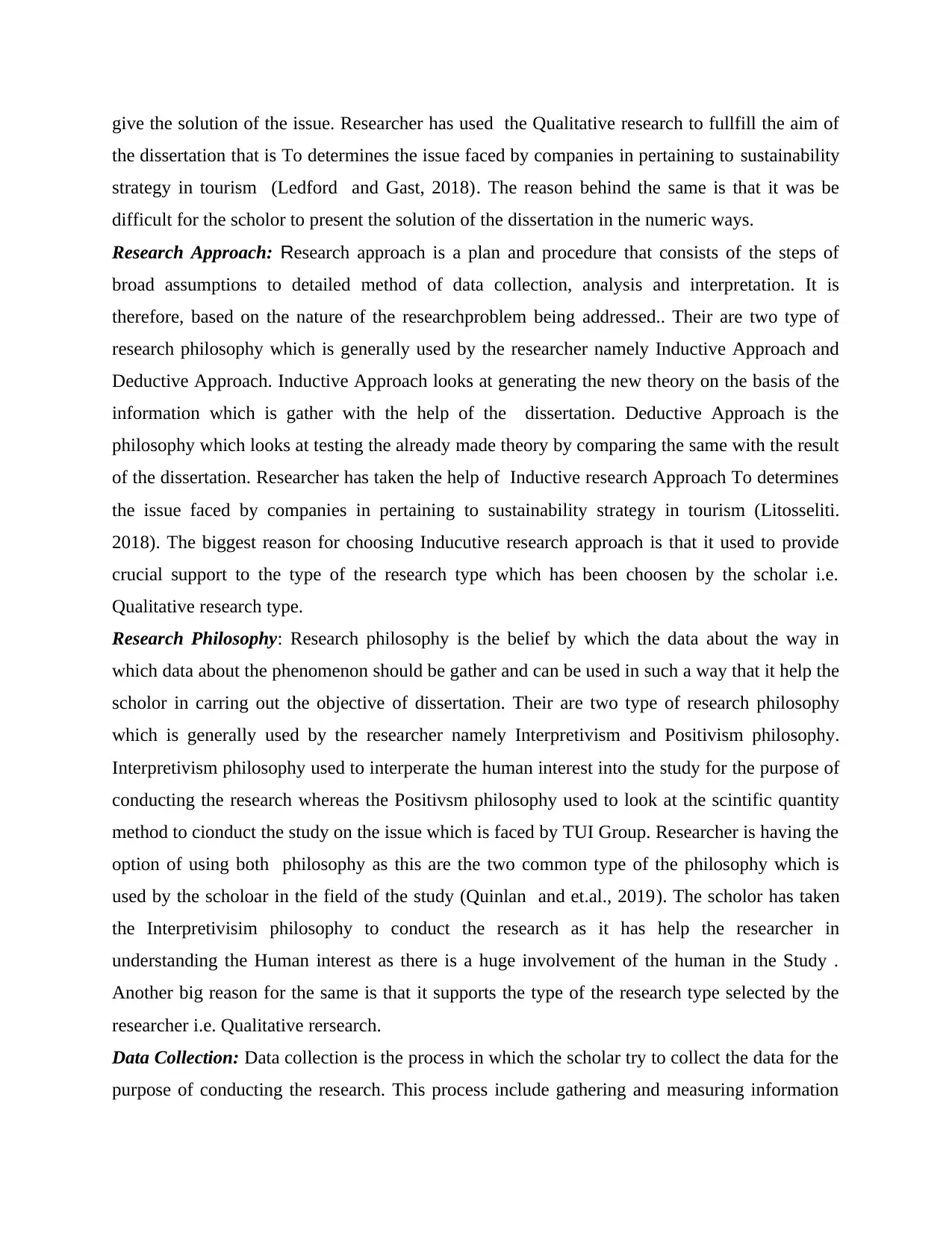
give the solution of the issue. Researcher has used the Qualitative research to fullfill the aim of
the dissertation that is To determines the issue faced by companies in pertaining to sustainability
strategy in tourism (Ledford and Gast, 2018). The reason behind the same is that it was be
difficult for the scholor to present the solution of the dissertation in the numeric ways.
Research Approach: Research approach is a plan and procedure that consists of the steps of
broad assumptions to detailed method of data collection, analysis and interpretation. It is
therefore, based on the nature of the researchproblem being addressed.. Their are two type of
research philosophy which is generally used by the researcher namely Inductive Approach and
Deductive Approach. Inductive Approach looks at generating the new theory on the basis of the
information which is gather with the help of the dissertation. Deductive Approach is the
philosophy which looks at testing the already made theory by comparing the same with the result
of the dissertation. Researcher has taken the help of Inductive research Approach To determines
the issue faced by companies in pertaining to sustainability strategy in tourism (Litosseliti.
2018). The biggest reason for choosing Inducutive research approach is that it used to provide
crucial support to the type of the research type which has been choosen by the scholar i.e.
Qualitative research type.
Research Philosophy: Research philosophy is the belief by which the data about the way in
which data about the phenomenon should be gather and can be used in such a way that it help the
scholor in carring out the objective of dissertation. Their are two type of research philosophy
which is generally used by the researcher namely Interpretivism and Positivism philosophy.
Interpretivism philosophy used to interperate the human interest into the study for the purpose of
conducting the research whereas the Positivsm philosophy used to look at the scintific quantity
method to cionduct the study on the issue which is faced by TUI Group. Researcher is having the
option of using both philosophy as this are the two common type of the philosophy which is
used by the scholoar in the field of the study (Quinlan and et.al., 2019). The scholor has taken
the Interpretivisim philosophy to conduct the research as it has help the researcher in
understanding the Human interest as there is a huge involvement of the human in the Study .
Another big reason for the same is that it supports the type of the research type selected by the
researcher i.e. Qualitative rersearch.
Data Collection: Data collection is the process in which the scholar try to collect the data for the
purpose of conducting the research. This process include gathering and measuring information
the dissertation that is To determines the issue faced by companies in pertaining to sustainability
strategy in tourism (Ledford and Gast, 2018). The reason behind the same is that it was be
difficult for the scholor to present the solution of the dissertation in the numeric ways.
Research Approach: Research approach is a plan and procedure that consists of the steps of
broad assumptions to detailed method of data collection, analysis and interpretation. It is
therefore, based on the nature of the researchproblem being addressed.. Their are two type of
research philosophy which is generally used by the researcher namely Inductive Approach and
Deductive Approach. Inductive Approach looks at generating the new theory on the basis of the
information which is gather with the help of the dissertation. Deductive Approach is the
philosophy which looks at testing the already made theory by comparing the same with the result
of the dissertation. Researcher has taken the help of Inductive research Approach To determines
the issue faced by companies in pertaining to sustainability strategy in tourism (Litosseliti.
2018). The biggest reason for choosing Inducutive research approach is that it used to provide
crucial support to the type of the research type which has been choosen by the scholar i.e.
Qualitative research type.
Research Philosophy: Research philosophy is the belief by which the data about the way in
which data about the phenomenon should be gather and can be used in such a way that it help the
scholor in carring out the objective of dissertation. Their are two type of research philosophy
which is generally used by the researcher namely Interpretivism and Positivism philosophy.
Interpretivism philosophy used to interperate the human interest into the study for the purpose of
conducting the research whereas the Positivsm philosophy used to look at the scintific quantity
method to cionduct the study on the issue which is faced by TUI Group. Researcher is having the
option of using both philosophy as this are the two common type of the philosophy which is
used by the scholoar in the field of the study (Quinlan and et.al., 2019). The scholor has taken
the Interpretivisim philosophy to conduct the research as it has help the researcher in
understanding the Human interest as there is a huge involvement of the human in the Study .
Another big reason for the same is that it supports the type of the research type selected by the
researcher i.e. Qualitative rersearch.
Data Collection: Data collection is the process in which the scholar try to collect the data for the
purpose of conducting the research. This process include gathering and measuring information
⊘ This is a preview!⊘
Do you want full access?
Subscribe today to unlock all pages.

Trusted by 1+ million students worldwide
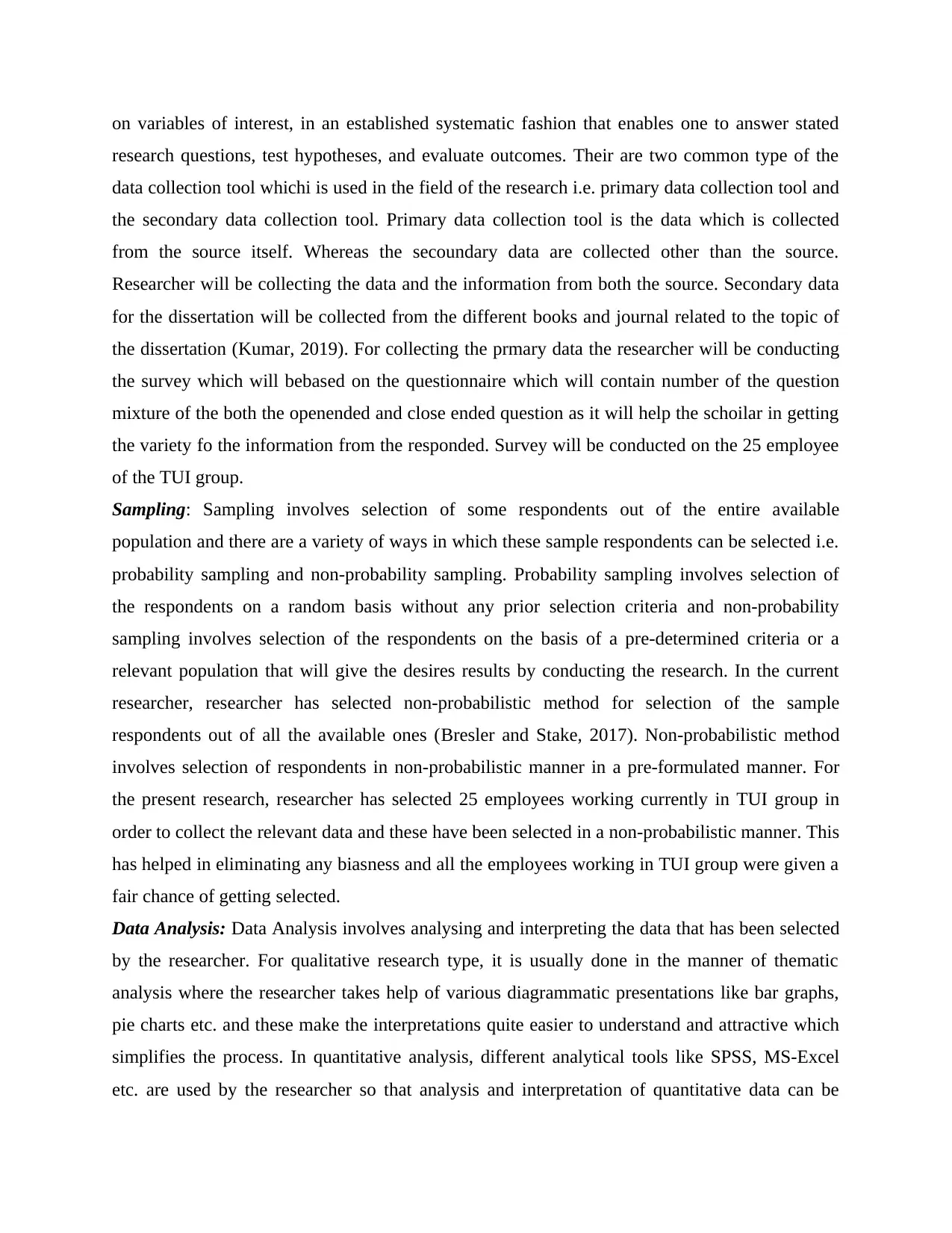
on variables of interest, in an established systematic fashion that enables one to answer stated
research questions, test hypotheses, and evaluate outcomes. Their are two common type of the
data collection tool whichi is used in the field of the research i.e. primary data collection tool and
the secondary data collection tool. Primary data collection tool is the data which is collected
from the source itself. Whereas the secoundary data are collected other than the source.
Researcher will be collecting the data and the information from both the source. Secondary data
for the dissertation will be collected from the different books and journal related to the topic of
the dissertation (Kumar, 2019). For collecting the prmary data the researcher will be conducting
the survey which will bebased on the questionnaire which will contain number of the question
mixture of the both the openended and close ended question as it will help the schoilar in getting
the variety fo the information from the responded. Survey will be conducted on the 25 employee
of the TUI group.
Sampling: Sampling involves selection of some respondents out of the entire available
population and there are a variety of ways in which these sample respondents can be selected i.e.
probability sampling and non-probability sampling. Probability sampling involves selection of
the respondents on a random basis without any prior selection criteria and non-probability
sampling involves selection of the respondents on the basis of a pre-determined criteria or a
relevant population that will give the desires results by conducting the research. In the current
researcher, researcher has selected non-probabilistic method for selection of the sample
respondents out of all the available ones (Bresler and Stake, 2017). Non-probabilistic method
involves selection of respondents in non-probabilistic manner in a pre-formulated manner. For
the present research, researcher has selected 25 employees working currently in TUI group in
order to collect the relevant data and these have been selected in a non-probabilistic manner. This
has helped in eliminating any biasness and all the employees working in TUI group were given a
fair chance of getting selected.
Data Analysis: Data Analysis involves analysing and interpreting the data that has been selected
by the researcher. For qualitative research type, it is usually done in the manner of thematic
analysis where the researcher takes help of various diagrammatic presentations like bar graphs,
pie charts etc. and these make the interpretations quite easier to understand and attractive which
simplifies the process. In quantitative analysis, different analytical tools like SPSS, MS-Excel
etc. are used by the researcher so that analysis and interpretation of quantitative data can be
research questions, test hypotheses, and evaluate outcomes. Their are two common type of the
data collection tool whichi is used in the field of the research i.e. primary data collection tool and
the secondary data collection tool. Primary data collection tool is the data which is collected
from the source itself. Whereas the secoundary data are collected other than the source.
Researcher will be collecting the data and the information from both the source. Secondary data
for the dissertation will be collected from the different books and journal related to the topic of
the dissertation (Kumar, 2019). For collecting the prmary data the researcher will be conducting
the survey which will bebased on the questionnaire which will contain number of the question
mixture of the both the openended and close ended question as it will help the schoilar in getting
the variety fo the information from the responded. Survey will be conducted on the 25 employee
of the TUI group.
Sampling: Sampling involves selection of some respondents out of the entire available
population and there are a variety of ways in which these sample respondents can be selected i.e.
probability sampling and non-probability sampling. Probability sampling involves selection of
the respondents on a random basis without any prior selection criteria and non-probability
sampling involves selection of the respondents on the basis of a pre-determined criteria or a
relevant population that will give the desires results by conducting the research. In the current
researcher, researcher has selected non-probabilistic method for selection of the sample
respondents out of all the available ones (Bresler and Stake, 2017). Non-probabilistic method
involves selection of respondents in non-probabilistic manner in a pre-formulated manner. For
the present research, researcher has selected 25 employees working currently in TUI group in
order to collect the relevant data and these have been selected in a non-probabilistic manner. This
has helped in eliminating any biasness and all the employees working in TUI group were given a
fair chance of getting selected.
Data Analysis: Data Analysis involves analysing and interpreting the data that has been selected
by the researcher. For qualitative research type, it is usually done in the manner of thematic
analysis where the researcher takes help of various diagrammatic presentations like bar graphs,
pie charts etc. and these make the interpretations quite easier to understand and attractive which
simplifies the process. In quantitative analysis, different analytical tools like SPSS, MS-Excel
etc. are used by the researcher so that analysis and interpretation of quantitative data can be
Paraphrase This Document
Need a fresh take? Get an instant paraphrase of this document with our AI Paraphraser
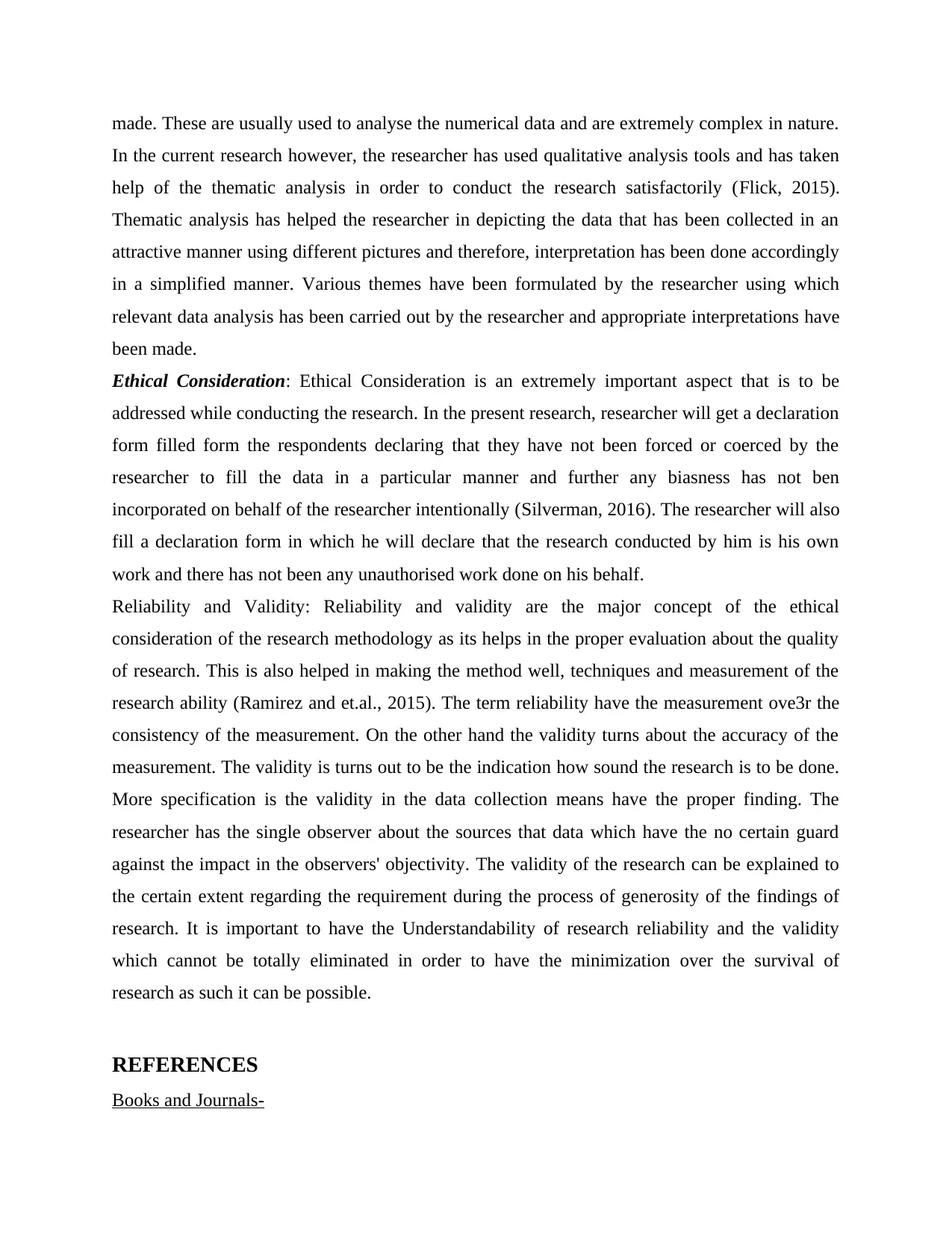
made. These are usually used to analyse the numerical data and are extremely complex in nature.
In the current research however, the researcher has used qualitative analysis tools and has taken
help of the thematic analysis in order to conduct the research satisfactorily (Flick, 2015).
Thematic analysis has helped the researcher in depicting the data that has been collected in an
attractive manner using different pictures and therefore, interpretation has been done accordingly
in a simplified manner. Various themes have been formulated by the researcher using which
relevant data analysis has been carried out by the researcher and appropriate interpretations have
been made.
Ethical Consideration: Ethical Consideration is an extremely important aspect that is to be
addressed while conducting the research. In the present research, researcher will get a declaration
form filled form the respondents declaring that they have not been forced or coerced by the
researcher to fill the data in a particular manner and further any biasness has not ben
incorporated on behalf of the researcher intentionally (Silverman, 2016). The researcher will also
fill a declaration form in which he will declare that the research conducted by him is his own
work and there has not been any unauthorised work done on his behalf.
Reliability and Validity: Reliability and validity are the major concept of the ethical
consideration of the research methodology as its helps in the proper evaluation about the quality
of research. This is also helped in making the method well, techniques and measurement of the
research ability (Ramirez and et.al., 2015). The term reliability have the measurement ove3r the
consistency of the measurement. On the other hand the validity turns about the accuracy of the
measurement. The validity is turns out to be the indication how sound the research is to be done.
More specification is the validity in the data collection means have the proper finding. The
researcher has the single observer about the sources that data which have the no certain guard
against the impact in the observers' objectivity. The validity of the research can be explained to
the certain extent regarding the requirement during the process of generosity of the findings of
research. It is important to have the Understandability of research reliability and the validity
which cannot be totally eliminated in order to have the minimization over the survival of
research as such it can be possible.
REFERENCES
Books and Journals-
In the current research however, the researcher has used qualitative analysis tools and has taken
help of the thematic analysis in order to conduct the research satisfactorily (Flick, 2015).
Thematic analysis has helped the researcher in depicting the data that has been collected in an
attractive manner using different pictures and therefore, interpretation has been done accordingly
in a simplified manner. Various themes have been formulated by the researcher using which
relevant data analysis has been carried out by the researcher and appropriate interpretations have
been made.
Ethical Consideration: Ethical Consideration is an extremely important aspect that is to be
addressed while conducting the research. In the present research, researcher will get a declaration
form filled form the respondents declaring that they have not been forced or coerced by the
researcher to fill the data in a particular manner and further any biasness has not ben
incorporated on behalf of the researcher intentionally (Silverman, 2016). The researcher will also
fill a declaration form in which he will declare that the research conducted by him is his own
work and there has not been any unauthorised work done on his behalf.
Reliability and Validity: Reliability and validity are the major concept of the ethical
consideration of the research methodology as its helps in the proper evaluation about the quality
of research. This is also helped in making the method well, techniques and measurement of the
research ability (Ramirez and et.al., 2015). The term reliability have the measurement ove3r the
consistency of the measurement. On the other hand the validity turns about the accuracy of the
measurement. The validity is turns out to be the indication how sound the research is to be done.
More specification is the validity in the data collection means have the proper finding. The
researcher has the single observer about the sources that data which have the no certain guard
against the impact in the observers' objectivity. The validity of the research can be explained to
the certain extent regarding the requirement during the process of generosity of the findings of
research. It is important to have the Understandability of research reliability and the validity
which cannot be totally eliminated in order to have the minimization over the survival of
research as such it can be possible.
REFERENCES
Books and Journals-
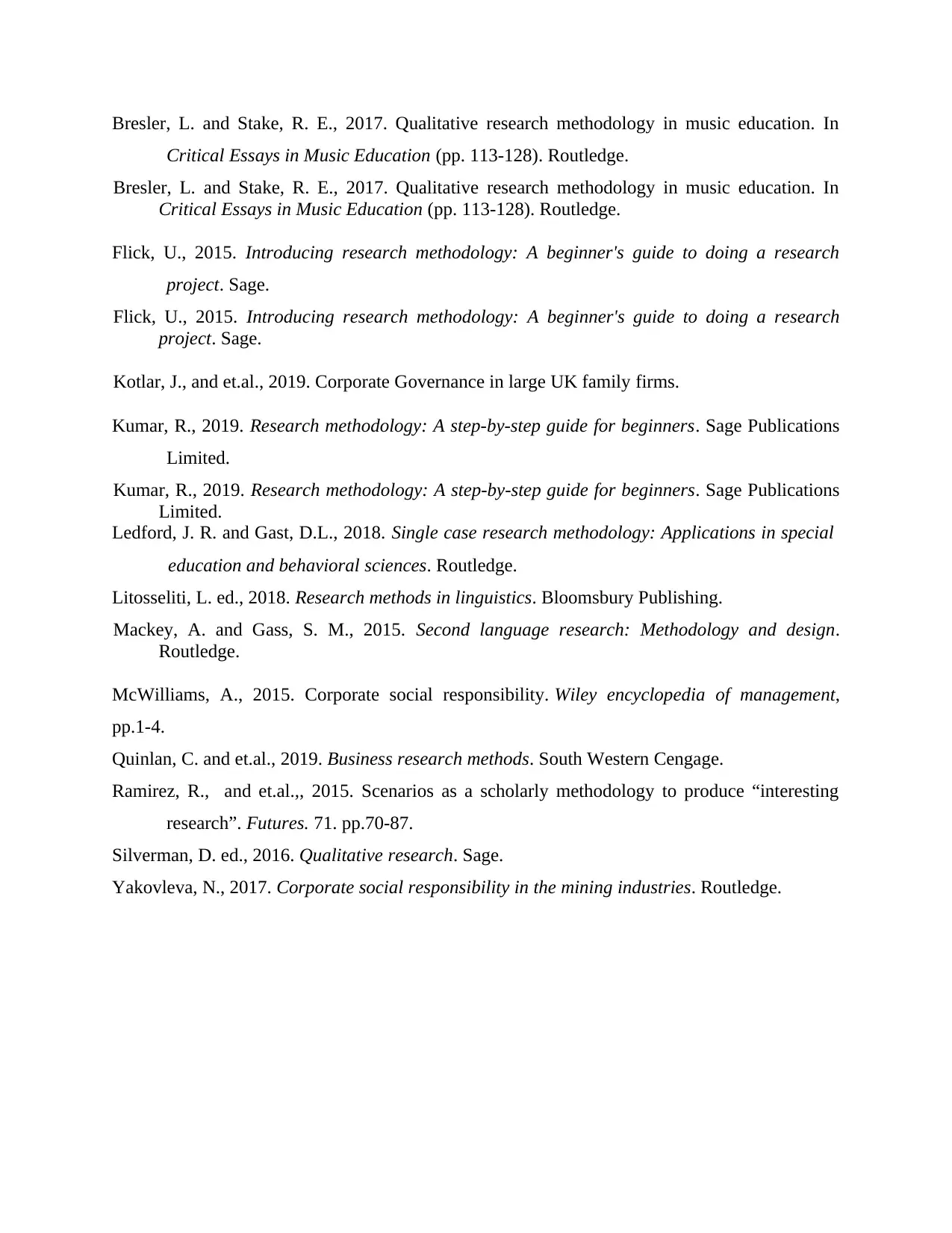
Bresler, L. and Stake, R. E., 2017. Qualitative research methodology in music education. In
Critical Essays in Music Education (pp. 113-128). Routledge.
Bresler, L. and Stake, R. E., 2017. Qualitative research methodology in music education. In
Critical Essays in Music Education (pp. 113-128). Routledge.
Flick, U., 2015. Introducing research methodology: A beginner's guide to doing a research
project. Sage.
Flick, U., 2015. Introducing research methodology: A beginner's guide to doing a research
project. Sage.
Kotlar, J., and et.al., 2019. Corporate Governance in large UK family firms.
Kumar, R., 2019. Research methodology: A step-by-step guide for beginners. Sage Publications
Limited.
Kumar, R., 2019. Research methodology: A step-by-step guide for beginners. Sage Publications
Limited.
Ledford, J. R. and Gast, D.L., 2018. Single case research methodology: Applications in special
education and behavioral sciences. Routledge.
Litosseliti, L. ed., 2018. Research methods in linguistics. Bloomsbury Publishing.
Mackey, A. and Gass, S. M., 2015. Second language research: Methodology and design.
Routledge.
McWilliams, A., 2015. Corporate social responsibility. Wiley encyclopedia of management,
pp.1-4.
Quinlan, C. and et.al., 2019. Business research methods. South Western Cengage.
Ramirez, R., and et.al.,, 2015. Scenarios as a scholarly methodology to produce “interesting
research”. Futures. 71. pp.70-87.
Silverman, D. ed., 2016. Qualitative research. Sage.
Yakovleva, N., 2017. Corporate social responsibility in the mining industries. Routledge.
Critical Essays in Music Education (pp. 113-128). Routledge.
Bresler, L. and Stake, R. E., 2017. Qualitative research methodology in music education. In
Critical Essays in Music Education (pp. 113-128). Routledge.
Flick, U., 2015. Introducing research methodology: A beginner's guide to doing a research
project. Sage.
Flick, U., 2015. Introducing research methodology: A beginner's guide to doing a research
project. Sage.
Kotlar, J., and et.al., 2019. Corporate Governance in large UK family firms.
Kumar, R., 2019. Research methodology: A step-by-step guide for beginners. Sage Publications
Limited.
Kumar, R., 2019. Research methodology: A step-by-step guide for beginners. Sage Publications
Limited.
Ledford, J. R. and Gast, D.L., 2018. Single case research methodology: Applications in special
education and behavioral sciences. Routledge.
Litosseliti, L. ed., 2018. Research methods in linguistics. Bloomsbury Publishing.
Mackey, A. and Gass, S. M., 2015. Second language research: Methodology and design.
Routledge.
McWilliams, A., 2015. Corporate social responsibility. Wiley encyclopedia of management,
pp.1-4.
Quinlan, C. and et.al., 2019. Business research methods. South Western Cengage.
Ramirez, R., and et.al.,, 2015. Scenarios as a scholarly methodology to produce “interesting
research”. Futures. 71. pp.70-87.
Silverman, D. ed., 2016. Qualitative research. Sage.
Yakovleva, N., 2017. Corporate social responsibility in the mining industries. Routledge.
⊘ This is a preview!⊘
Do you want full access?
Subscribe today to unlock all pages.

Trusted by 1+ million students worldwide
1 out of 12
Related Documents
Your All-in-One AI-Powered Toolkit for Academic Success.
+13062052269
info@desklib.com
Available 24*7 on WhatsApp / Email
![[object Object]](/_next/static/media/star-bottom.7253800d.svg)
Unlock your academic potential
Copyright © 2020–2025 A2Z Services. All Rights Reserved. Developed and managed by ZUCOL.





